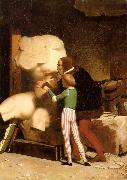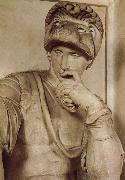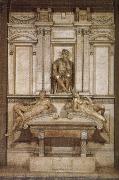Wholesale Oil Painting Reproductions No Minimum and Door to Door! |
|||||||||||
|
|
|||||||||||

|
|||||||||||
|
|
|
||||||||
All Jean Leon Gerome Oil Paintings |
||||||||
|
|
||||||||
|
|
||||||||
|
Artist Introduction: French
1824-1904
Jean Leon Gerome Galleries
French painter, sculptor, and teacher. Son of a goldsmith, he studied in Paris and painted melodramatic and often erotic historical and mythological compositions, excelling as a draftsman in the linear style of Jean-Auguste-Dominique Ingres. His best-known works are scenes inspired by several visits to Egypt. In his later years he produced mostly sculpture. He exerted much influence as a teacher at the Ecole des Beaux-Arts; his pupils included Odilon Redon and Thomas Eakins. A staunch defender of the academic tradition, he tried in 1893 to block the government acceptance of the Impressionist works bequeathed by Gustave Caillebotte.
|
||||||||
|
|
||||||||
|
Michelangelo Painting ID:: 1427 |
1849
Catalogue #26
51.5 x 45 cm (20.25 x 17.75 inches)
Private collection |
|||||||
Height Width |
INS/CM Quality |
|||||||
|
X |
| |||||||
|
|
||||||||
All Pontormo Oil Paintings |
||||||||
|
|
||||||||
|
|
||||||||
|
Artist Introduction: Italian Mannerist Painter, 1494-ca.1556
Italian painter and draughtsman. He was the leading painter in mid-16th-century Florence and one of the most original and extraordinary of Mannerist artists. His eccentric personality, solitary and slow working habits and capricious attitude towards his patrons are described by Vasari; his own diary, which covers the years 1554-6, further reveals a character with neurotic and secretive aspects. Pontormo enjoyed the protection of the Medici family throughout his career but, unlike Agnolo Bronzino and Giorgio Vasari, did not become court painter. His subjective portrait style did not lend itself to the state portrait. He produced few mythological works and after 1540 devoted himself almost exclusively to religious subjects. His drawings, mainly figure studies in red and black chalk, are among the highest expressions of the great Florentine tradition of draughtsmanship; close to 400 survive, forming arguably the most important body of drawings by a Mannerist painter. |
||||||||
|
|
||||||||
|
|
Michelangelo Painting ID:: 62015 |
mk276 1520 years Medici Chapel in Florence |
||||||
Height Width |
INS/CM Quality |
|||||||
|
X |
| |||||||
|
|
||||||||
All Pontormo Oil Paintings |
||||||||
|
|
||||||||
|
|
||||||||
|
Artist Introduction: Italian Mannerist Painter, 1494-ca.1556
Italian painter and draughtsman. He was the leading painter in mid-16th-century Florence and one of the most original and extraordinary of Mannerist artists. His eccentric personality, solitary and slow working habits and capricious attitude towards his patrons are described by Vasari; his own diary, which covers the years 1554-6, further reveals a character with neurotic and secretive aspects. Pontormo enjoyed the protection of the Medici family throughout his career but, unlike Agnolo Bronzino and Giorgio Vasari, did not become court painter. His subjective portrait style did not lend itself to the state portrait. He produced few mythological works and after 1540 devoted himself almost exclusively to religious subjects. His drawings, mainly figure studies in red and black chalk, are among the highest expressions of the great Florentine tradition of draughtsmanship; close to 400 survive, forming arguably the most important body of drawings by a Mannerist painter. |
||||||||
|
|
||||||||
|
|
Michelangelo Painting ID:: 62016 |
mk276 1520 years Medici Chapel in Florence |
||||||
Height Width |
INS/CM Quality |
|||||||
|
X |
| |||||||
|
|
||||||||
|
Prev Next
|
||||||||
|
|
||||||||
|
Related Paintings to Pontormo :. |
||||||||
|
|
||||||||
|
CONTACT US |



